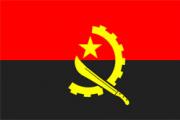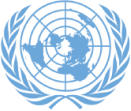Permanent Mission of the Republic of Angola to the United Nations
The Angolan Mission to the United Nations in New York is one of our three posts (along with our diplomatic missions in Geneva and Vienna) representing Angola's interests in the United Nations system.
Our Ambassador and Permanent Representative, H.E. Mr. Francisco José da Cruz, heads the Angolan Mission, which comprises of a team of diplomats and experts. The Mission provides the nucleus of Angolan delegations to UN conferences and meetings in New York, including regular and special sessions of the General Assembly.
In January 2003, Angola acceded to the Security Council as a Non-Permanent Member and its mandate expired in December 2004. In November 2003, the Republic of Angola presided over the Security Council and also participated in the ongoing work of the other organs of the UN, such as the General Assembly, Ecosoc, and the Trusteeship Council etc. and continues to monitor the activities of the UN's specialized agencies and programs. Yet, as far as the ECOSOC is concerned, on October 2005, Angola was elected as a member of the Council with a majority of 186 votes.For the first time in the history of the United Nations and as a peace-loving country, on May 12, 2006, Angola guaranteed its seat on the newly established Peacebuilding Commission. Subsequent to that, on June 23, 2006, Angolan ambassador to UN, Ismael Gaspar Martins, was elected by acclamation for a one-year term as Chairman of the Peacebuilding Commission, tasked with ensuring post-conflict peace.
Angola is firmly committed to the UN system. As an African nation, emerging from almost 30 years of civil war, Angola has substantial interest to having effective mechanisms for multilateral cooperation that complement our bilateral and regional relationships.
The UN's importance to Angola can be seen in core areas, such as international peace and security (including arms control and disarmament) and the development of international legal instruments and norms. It is also found in the work of the UN's programs and technical agencies, which deal with issues such as the provision of humanitarian assistance, assistance to vulnerable groups such as women and children, and protection of the environment and sustainable development.
One of Angola's main priorities in the UN's agenda over the past years has been the question of peace in the world, Africa, and particularly in sub-Sahara region. Angola has actively supported the UN popular consultation process at the UN Security Council level, to restore order and stability around the globe.
Terrorism
Terrorism has become increasingly an international issue, and close cooperation between governments has proved to be crucial. The UN plays a key role in the fight against the terrorist threat by providing a forum for the negotiation of international conventions. The existing conventions adopted by the UN impose a duty on parties either to extradite or prosecute an alleged terrorist found in their territory. The aim of these conventions is to limit the countries where terrorists may find safe haven.
Angola is a key element of this international system of cooperation against terrorism.
Disarmament and International Security
Angola sees global disarmament efforts as central to international peace and security. As a member of the United Nations Angola is working hard to maintain progress on a range of issues such as arms and control initiatives. At the Security Council, Angola played a valuable role in enhancing the effectiveness of the international nuclear nonproliferation regime in the coming future.
Angola is also focused on expanding the international arms control agenda to address the proliferation of small arms and light weapons. Angola also played a constructive role and has taken a tough stance on matters related to Illicit Trade in Small Arms and Light Weapons in All its Aspects, which has resulted in the adoption of an international program of action addressing areas such as management of weapons stockpiles, export controls and transparency.
Angola is a long-standing supporter of the UN's role in peacekeeping. Emerging from some three decades of civil war Angola have largely contributed to the promotion of policies enabling peace and security around the globe.
Environment
The UN's agenda on global environment issues is also a high priority for the Angolan Government. Angola is a signatory to a number of conventions on environmental protection and conservation.
International Law
Another important area for Angola in the UN system is the development and strengthening of international legal instruments and norms. Angola has been at the forefront of efforts to create an International Criminal Court (ICC) to address serious crimes of concern to the international community. On October 7 1998, Angola signed the Rome Statute of the International Criminal Court, as a clear sign of our commitment to justice as well as strengthen the international legal system.
Human Rights
Angola also sees an important role for the UN in the promotion and protection of human rights. We are committed to the effective functioning of the UN's human rights system, which includes a suite of treaties and declarations, bodies such as the Human Rights Council, and a range of mechanisms for monitoring and advising States on human rights issues. Angola is a party to all major human rights treaties.
UN Reform
The Republic of Angola has been a strong proponent of revitalizing the UN for some time - not for reform's sake itself, but to make the system more efficient and effective, and more accountable to its Member States. Angola has for some time held the view that the Security Council should be enlarged to better reflect contemporary global political realities


